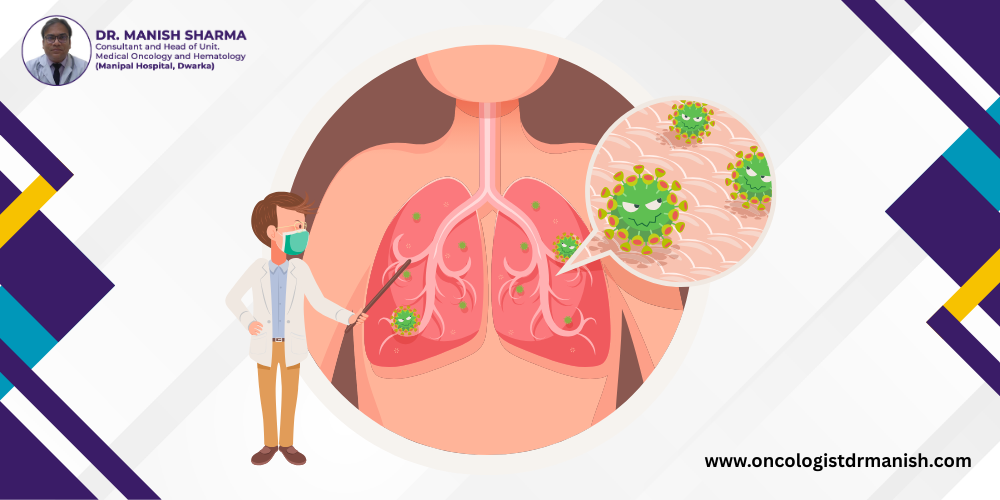Lung cancer is one of the leading causes of cancer deaths worldwide. Many people do not notice the signs of lung cancer until the disease has progressed to an advanced stage. Recognizing the early symptoms of lung cancer and understanding the risk factors can make a big difference in treatment outcomes. In this article, we will explore common signs of lung cancer, causes, and prevention tips to help protect your health.
Common Signs and Symptoms of Lung Cancer
1. Persistent Cough
A cough that doesn’t go away or gets worse over time may be an early warning sign. It can produce rust-colored or bloody sputum.
2. Shortness of Breath
Difficulty breathing or wheezing after light activity may indicate lung cancer. This happens when tumors block or narrow the airways.
3. Chest Pain
Pain in the chest, shoulder, or back that worsens with laughter, coughing, or deep breathing should not be ignored.
4. Hoarseness
A change in your voice, especially hoarseness, can occur when lung cancer affects the nerves controlling the vocal cords.
5. Unexplained Weight Loss
Losing weight without trying is often linked to cancer. Rapid, unexplained weight loss is a common symptom of lung cancer.
6. Fatigue
Feeling weak or tired even after rest may signal that your body is fighting an illness like lung cancer.
7. Loss of Appetite
A sudden drop in appetite or feeling full after a small meal may be another warning sign.
8. Recurrent Respiratory Infections
Frequent bouts of pneumonia or bronchitis could mean lung cancer is blocking the airways.
9. Bone Pain
Pain in the back or hips may suggest that cancer has spread to the bones.
10. Headaches
Persistent or worsening headaches may occur if the cancer spreads to the brain or presses on blood vessels.
Main Risk Factors for Lung Cancer
Smoking
Cigarette smoking is the leading cause of lung cancer. The carcinogens in tobacco smoke damage lung cells over time.
Secondhand Smoke
Non-smokers exposed to secondhand smoke are also at risk.
Radon Gas
This naturally occurring radioactive gas can seep into homes from the ground and increase lung cancer risk.
Asbestos and Other Carcinogens
Exposure to asbestos, arsenic, chromium, nickel, and diesel exhaust can raise the risk significantly.
Genetic and Family History
Some people inherit genetic mutations or have a family history that makes them more vulnerable.
Air Pollution
Long-term exposure to polluted air with high levels of particulate matter can harm the lungs.
Radiation Therapy
Past radiation treatments to the chest for other conditions can increase the risk later in life.
Prevention and Early Detection
The best way to prevent lung cancer is to avoid smoking and limit exposure to harmful substances. If you are at high risk, talk to your doctor about screening options like low-dose CT scans. Early detection greatly improves the chances of successful treatment.
Take Action for Your Lung Health
Early detection is key to successfully treating lung cancer. If you notice any persistent symptoms like a chronic cough, chest pain, or unexplained weight loss, schedule a check-up with your doctor immediately.
For expert care, consult Dr. Manish Sharma, one of the best cancer specialists in Delhi. Regular screening and lifestyle changes can make a significant difference. Avoid tobacco, minimize exposure to harmful substances, and prioritize a healthy lifestyle.
📌 Contact Dr. Manish Sharma here: https://oncologistdrmanish.com/contact.php
Conclusion
Lung cancer often develops silently, but paying attention to early signs can save lives. Watch for persistent coughs, chest pain, or unexplained weight loss. By reducing risk factors and seeking medical advice early, you can take control of your lung health.
Frequently Asked Questions (FAQs)
Ans: Early signs often include a persistent cough, shortness of breath, chest pain, or unexplained weight loss.
Ans: Yes. Many people do not notice symptoms until the cancer has advanced, which is why screening is important for high-risk groups.
Ans: Smokers, people exposed to secondhand smoke, radon gas, asbestos, or air pollution, and those with a family history of lung cancer are at higher risk.
Ans: Doctors may use imaging tests like CT scans, chest X-rays, and biopsies to confirm a diagnosis.
Ans: While not all cases are preventable, avoiding smoking, reducing exposure to toxins, and maintaining a healthy lifestyle can lower the risk.

